- Home
- Jeff Mariotte
Bolthole Page 2
Bolthole Read online
Page 2
Said occupant—Lieutenant Robert Sanchez—was on the floor between the couch and the coffee table, which had been tipped over on its side. Blood had pooled and congealed all around him, dark against the floorboards and visible mostly because light from outside glinted off it. But even if he hadn’t seen it, Sam had smelled it the moment he’d passed through the front door. Blood and more—the unmistakable scent of death.
Bobby Sanchez had died, and he’d gone the hard way.
All the fingers on both hands had been broken, and both thumbs had been cut off. His jaw was shattered and his left eye had been gouged from its socket. He was naked, and his skin was covered with cuts, mostly shallow but some deep, from the soles of his feet to the top of his shaved head. His flesh was so bruised it was impossible to tell where one contusion left off and another began. His wrists and ankles were bound with nylon rope.
“SEALs are trained to withstand torture, right?” Callen asked.
“Yeah.”
“Maybe that training didn’t do Sanchez any favors. You think he gave up whatever somebody wanted to know?”
“Everybody has a breaking point,” Sam said. “Can’t say what his was, but what he went through would have been way too much for most people.”
“You didn’t know him, right?”
Callen already knew the answer to that. Sam wouldn’t be here if he’d known Sanchez. Or he might have been, but the case would have gone to another team. No matter how hard agents tried to leave personal feelings at the door, they were only human, and a close emotional connection to a case tended to act as blinders. Sam, in particular, had been told that he sometimes got too involved. He supposed that was true, though he had no intention of changing. That involvement was what drove him. He wanted to right the wrongs, to seek justice on behalf of people who couldn’t do it for themselves.
People like Bobby Sanchez.
“Right,” he acknowledged.
“Looks like he was worked over for a long time. Neighborhood like this, you’d think somebody would’ve heard something.”
Sam had been thinking the same thing. “Let’s talk to those detectives.”
He was glad not to be looking at Sanchez’s body anymore, although he knew the image would stay with him forever. They found the detectives in the yard, talking to the two unis.
“Excuse me, Detective Melloy? And…” Callen let the sentence trail off. Sam figured he didn’t know the older detective’s name, either.
“Jackson,” the man said. “Mickey Jackson. Mick.”
“I’m Callen, he’s Hanna.”
“I know. What can we do for you?”
“Have you started canvassing the neighbors? See if anybody saw or heard anything?”
“We’re still waiting on the manpower for that, but we will,” Jackson said. “My guess? The house next door is vacant. This is a corner lot, with a good-sized yard, so the place around the corner isn’t too close. Sanchez lived alone, and I get the feeling this isn’t a neighborhood where people poke their noses in other folks’ business.”
“How do you figure?”
“I’m a detective. I detected that no one has come around since we got here, looking to see what’s going on, and from that I deduced that people here mind their own beeswax.”
“He’s good at that deducing stuff,” Melloy added.
“How was Sanchez found, then?”
“One of yours,” Melloy replied. “A Navy counselor named Jim Hawthorne had an early appointment with him today. When he got here, no one answered the door. He walked around back and the kitchen door was ajar, so he went inside.”
“Where is he now?” Sam asked.
“Being questioned at the station, although he’d probably rather be on some other counselor’s couch. He was really shaken up.”
“We’ll need to talk to him,” Callen said. “This is our investigation, now.”
“Of course it is,” Jackson said. “I know how this works. Feds come in, step all over the locals—”
Sam cut him off. “It ain’t like that.”
“No?”
“He’s one of ours. You’d feel the same way if he was LAPD, and we’d understand.”
“I’ve seen how understanding you guys are. One time the Bureau—”
Melloy touched his arm. “Sam and Callen aren’t the Bureau. You haven’t worked with them, but I have. They’re okay.”
Jackson shrugged. “You say so.”
“We’ll keep you involved,” Callen said. “Your guys can process the scene, just be sure we get the full data set—not just the conclusion. You’ll be in the loop. Like Agent Hanna said, Sanchez was a SEAL. That makes him family. We’re not trying to step on anybody’s toes, but we run the investigation.”
Jackson breathed a sigh of resignation. “Okay, whatever. We’ll work the scene, canvass. Let you know what we come up with.”
“And we’ll do the same for you,” Sam replied.
“Appreciate it.”
“We’re all on the same side here,” Melloy offered. “Let’s try to act like it.”
“I will if they will,” Jackson said.
“Detective Jackson,” Callen said, “you’ve got my word.”
2
Jim Hawthorne was a civilian counselor who divided his time between the Naval Medical Center in San Diego, the Robert E. Bush Naval Hospital in Twentynine Palms, and VA facilities in Long Beach and L.A. As if that didn’t keep him busy enough, he also made home visits in certain cases. Bobby Sanchez had apparently been one of those cases, and Callen wanted to find out why. Detective Melloy had made a phone call, at his request, and the LAPD had delivered Hawthorne to the Boatshed by the time Callen and Sam arrived.
“I already told the police everything,” Hawthorne said. “About ten times, in fact.”
“They just want to make sure you got your story straight,” Sam said. “We operate a little differently here. We don’t need to hear it ten times. We just need to hear it once. As long as it’s true. If it’s not, that’s when we start having problems.”
“Look, I don’t want any trouble with you. We work for the same people, right? You’re NCIS, I’m a Department of the Navy civilian.”
“He’s right, Special Agent Hanna,” Callen said. “Go easy on him and he’ll tell us what he knows.”
“That’s right!” Hawthorne looked at Callen like he had tossed him a lifeline when he was about to drown. He was thin, with a shock of curly auburn hair and a neatly trimmed beard. He wore wire-rim glasses with oval frames, reminding Callen of that Beatle who’d been shot. John Lennon, that was his name. Hawthorne was fifty-two, according to the personnel file Nell had sent over to Callen’s phone, so old enough to remember the Beatles as something more than historical figures. The counselor wore a blue Oxford shirt, button-down, faded Levi’s, and brown Mephisto shoes. Sensible, not cheap but not outrageously pricey. Callen figured he’d been a hippie, but at the tail end of the scene, when most of the original hippies had already cut their hair and found jobs.
“Peace, brothers,” Callen said. “There’s no need for conflict. Jim—is it okay if I call you Jim?—just tell us what happened this morning at the Sanchez house.”
Hawthorne blew out a breath, as if he’d been holding it for days. He ran long fingers across his damp forehead. The day was hot, and sometimes the team liked to keep the Boatshed on the steamy side when they were going to be interrogating suspects. Callen didn’t know yet whether Hawthorne was a suspect, but they’d opted for warmish, just in case.
“I had an appointment with Bobby. I was supposed to be there at seven-thirty.”
“That’s early,” Sam said.
“Bobby hasn’t been sleeping much. Nights are hard for him, so he likes to make his appointments early in the morning.”
“What are you seeing him for?” Callen asked.
Hawthorne frowned. “That’s confidential. I’m sure you understand.”
“What we understand,” Sam said, “is that a Navy SE
AL was tortured and murdered. I think any issues of doctor–patient confidentiality are less important now than finding out who did that, and why.”
“Yes, well…” Hawthorne steepled his fingers on the table. “You can probably guess a lot of it. Sanchez saw action in Iraq and Afghanistan, among other places. And the kind of action SEALs tend to see is different from what most sailors encounter.”
“Yeah, I know,” Sam said. “Been there, got the nightmares. So you were helping him with PTSD?”
Hawthorne squirmed uncomfortably in his seat. Even though the patient was beyond caring, he looked uncomfortable about giving away too many details. Callen had to appreciate that, even though it made his job more difficult.
“Yes, that’s right,” the counselor finally said.
“Anything else?”
“Trust me, PTSD is a handful. It’s one of those things that can’t be diagnosed through lab tests or anything like that. It’s more a set of symptoms. When a patient presents with the right ones—cognition and mood symptoms, avoidance, reactivity and arousal, and re-experiencing symptoms, for at least a month, he or she is considered to be suffering from PTSD.”
“And Sanchez had those?” Callen asked.
“Big time. Like I said, he hardly slept. He didn’t like to talk about the things he’d done and seen, and sometimes he claimed he didn’t remember a lot of the details. He was constantly on edge, startled almost out of his wits by sudden, loud noises. Borderline paranoid, I’d say. He was the kind of guy who liked to sit with his back to the wall, and checked out the windows a lot.”
“Maybe it wasn’t paranoia,” Sam suggested. “Maybe someone really was after him. You know, considering what happened to him.”
“Believe me, I’ve thought about that. Since this morning, especially. I always thought it was just the trauma, and if he knew about any genuine threats, he never confided in me about them.”
“What happened to him wasn’t random. Someone doesn’t just go into any old house and do that to the guy inside,” Callen said. “That was personal. Sanchez was targeted.”
“I… didn’t really get a good look,” Hawthorne said. “As soon as I saw him, I ran out and called nine-one-one.”
“You didn’t stick around?”
“I went back to my car and sat in it with the motor running until the police arrived. I didn’t know if whoever had done that was still around, you know? If anyone came out of that house, or came toward my car, I’d have floored it out of there.”
“Tell us exactly what you saw,” Sam said. “From when you got out of your car the first time.”
“Like I said, it was early. The neighborhood was quiet. There were a few cars on the roads, people going to work. A block or so from Bobby’s house there was a bus stop, and some people were there, you know, with lunch pails, briefcases. Just a regular weekday. I stopped in front of his house, got out, went to the front door. His doorbell’s broken—or that’s what he says, but I think he disconnected it. He really didn’t like having visitors. Anyway, I knocked, like I usually do. Most of the time, he’s ready for me and opens the door before I even have a chance to knock, but when I do knock, he’s always there right away. Like he’s been watching me since I pulled up. I expect he usually was.
“Anyway, this time I knocked, and nobody answered. That was really unusual. I waited a minute, and knocked again. Nothing. I actually checked the calendar on my phone, to make sure I had the right day. I did, so I went around to the back, because Bobby had a back door that opened out of the kitchen. I thought maybe he was back there, out in the yard or in the kitchen. When I got back there, the door was open. I poked my head in, called him a couple of times. He didn’t answer, and I started to get really worried.”
“Worried why?” Sam asked. “Did you think he had enemies who meant him harm?”
“Not that so much,” Hawthorne replied. He stroked his bearded chin, like a professor in a cartoon. “But with PTSD, suicide is always a concern. I half-expected to find him dead by his own hand.”
“Obviously you didn’t.”
“No. Like I said, when I got into the living room and saw him—all the cuts, all the blood—I knew he was dead. I took off out of there and called for help.”
“Did he ever name any enemies who might want to hurt him?” Callen asked.
“No, nothing like that. He always felt like he was in some kind of danger, but I think it was a vague, nonspecific danger. More a reflection of the fact that on combat missions, the possibility of violent death was always there, and that level of alertness wasn’t easy to shut down.”
Callen passed a card across the table to Hawthorne. “Thanks for your help,” he said. “If you remember anything else, let us know. Anything at all, no matter how insignificant it might seem. You never know what might turn out to be important.”
Hawthorne’s expression was so grateful Callen was almost embarrassed by it. Strike the almost; he was embarrassed. Hawthorne looked like a guy whose life sentence had just been commuted. He hadn’t suspected the counselor had anything to do with Sanchez’s death, and having met the man, he was certain of it. Sanchez put up a fight—the condition of his living room testified to that. He could have taken Jim Hawthorne blindfolded, with both arms and legs tied behind his back. No, whoever had done that to Bobby Sanchez was a considerably more dangerous person—or persons—and he, or they, had to be found.
Callen got the feeling that Sanchez’s death was the beginning of something, not the end. And anything that started that bad was only going to get worse.
3
June 14
“Spider-Man or Batman?”
“Deeks, that’s not even a question. Spider-Man or Batman what? Which one would I date? Neither. They’re both fictional, and that’s just the beginning of my objections.”
“I wouldn’t expect you to date either of them. That’s kind of my exclusive province.”
Kensi didn’t answer.
“Isn’t it?”
She sighed. “Yes, Deeks. Unless I decide to go on the prowl for someone who doesn’t bother me with nonsensical questions while I’m trying to work.”
“Nonsensical? You’re the one who asked me which Ninja Turtle I am.”
“Oh. My. God. Is this about that? You’re still upset about that? That was—”
“That was at an intimate moment,” he reminded her. “And it’s difficult to maintain the appropriate mood when you’re trying to figure out whether your partner would be more romantically interested in Leonardo, Michelangelo, Donatello, or… I’m blank.”
“Raphael.”
“Raphael! That’s the one. I was just going to say that.”
“Sure, you were.”
“Mr. Deeks, Ms. Blye.”
Henrietta Lange’s voice cut through the moment’s tension and the stillness of the bullpen. Both agents looked up at her, barely taller than the balustrade at which she stood.
“Would you join me upstairs, please?”
“We would be happy to, Hetty,” Kensi replied. “Thrilled, even, if it’ll get Deeks to stop pestering me with absurd questions that don’t really have answers.”
“That sounds like a fascinating philosophical challenge,” Hetty said. “What was the question, Mr. Deeks?”
He and Kensi were both starting up the wooden stairs, she two steps ahead of him. He didn’t mind the view. “The question was, Spider-Man or Batman?”
“By which he means—”
Hetty cut her off. “The meaning is obvious, Ms. Blye. ‘Which would prevail in combat?’ The answer is equally obvious. Batman.”
“Exactly,” Deeks agreed.
“Why Batman?” Kensi asked.
“Spider-Man has the proportionate strength of a spider, thanks to being bitten by a radioactive one, while Batman is simply a human, albeit one who has trained extensively in the martial arts and is in peak physical condition. In the end, however, Spider-Man is young, immature, and somewhat idealistic. Batman, on the other hand,
is a narcissistic sociopath of the highest order. In a fight, he simply would not quit, while I can’t say the same for Spider-Man.”
“And there you have it, my dear,” Deeks said. “From the voice of experience.”
“You do realize, Hetty, that they’re both fictional characters. How they would do in a fight would be up to whoever was writing it.”
They had reached the top of the staircase, and Hetty was already on her way into the Operations Center. Now she stopped and slowly turned toward them. “Of course I realize that, Kensi. I’m not an idiot, after all.”
“No!” Kensi blurted out. “I didn’t mean to imply… I was just…”
“I know, dear. It’s all right. I’m simply having some fun. At your expense, for which I apologize.”
She turned again and disappeared into the darkened room. Deeks and Kensi followed. As they entered, Eric Beale was walking out clutching several file folders. “She said Batman, didn’t she?” he asked.
“What other answer is there?”
“Nell and I had the same argument once, and Hetty made a perfectly valid case for Spider-Man. I honestly believe she chooses whichever answer she thinks will end the conversation sooner.”
Kensi faced Deeks, and he braced for her “So there!” face. But Hetty spoke again before she could pull it together. “Mr. Deeks, what I’m going to ask you to watch will be particularly difficult for you, I believe. I suggest you prepare yourself.”
Kensi’s expression went flat, then sympathetic. Deeks wasn’t sure how to take Hetty’s warning. How was he supposed to prepare himself without knowing what it was he was preparing for? “I, uhh, I’m prepared. I guess. As prepared as I’m going to be.”

 City Under the Sand
City Under the Sand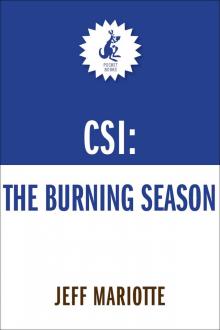 The Burning Season
The Burning Season Sanctuary
Sanctuary Winds of the Wild Sea
Winds of the Wild Sea Serpents in the Garden
Serpents in the Garden Close to the Ground
Close to the Ground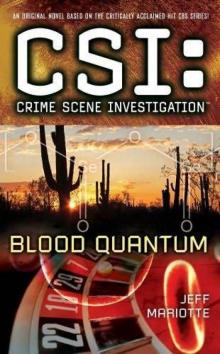 Blood Quantum
Blood Quantum Brass in Pocket
Brass in Pocket City Under the Sand: A Dark Sun Novel (Dungeons & Dragons: Dark Sun)
City Under the Sand: A Dark Sun Novel (Dungeons & Dragons: Dark Sun) Witch's Canyon
Witch's Canyon STAR TREK: The Lost Era - 2355-2357 - Deny Thy Father
STAR TREK: The Lost Era - 2355-2357 - Deny Thy Father Dawn of the Ice Bear
Dawn of the Ice Bear The Xander Years, Vol.2
The Xander Years, Vol.2 Ghost of the Wall
Ghost of the Wall 30 Days of Night: Light of Day
30 Days of Night: Light of Day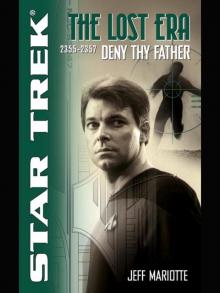 Deny Thy Father
Deny Thy Father Criminal Minds
Criminal Minds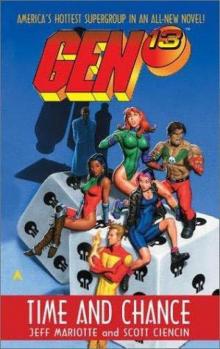 Time and Chance
Time and Chance The Folded World
The Folded World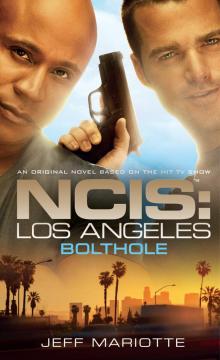 Bolthole
Bolthole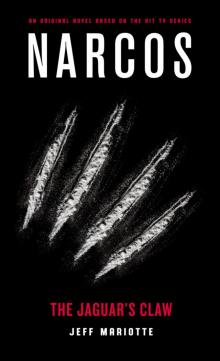 Narcos
Narcos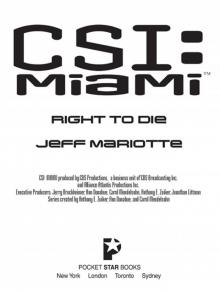 Right to Die
Right to Die